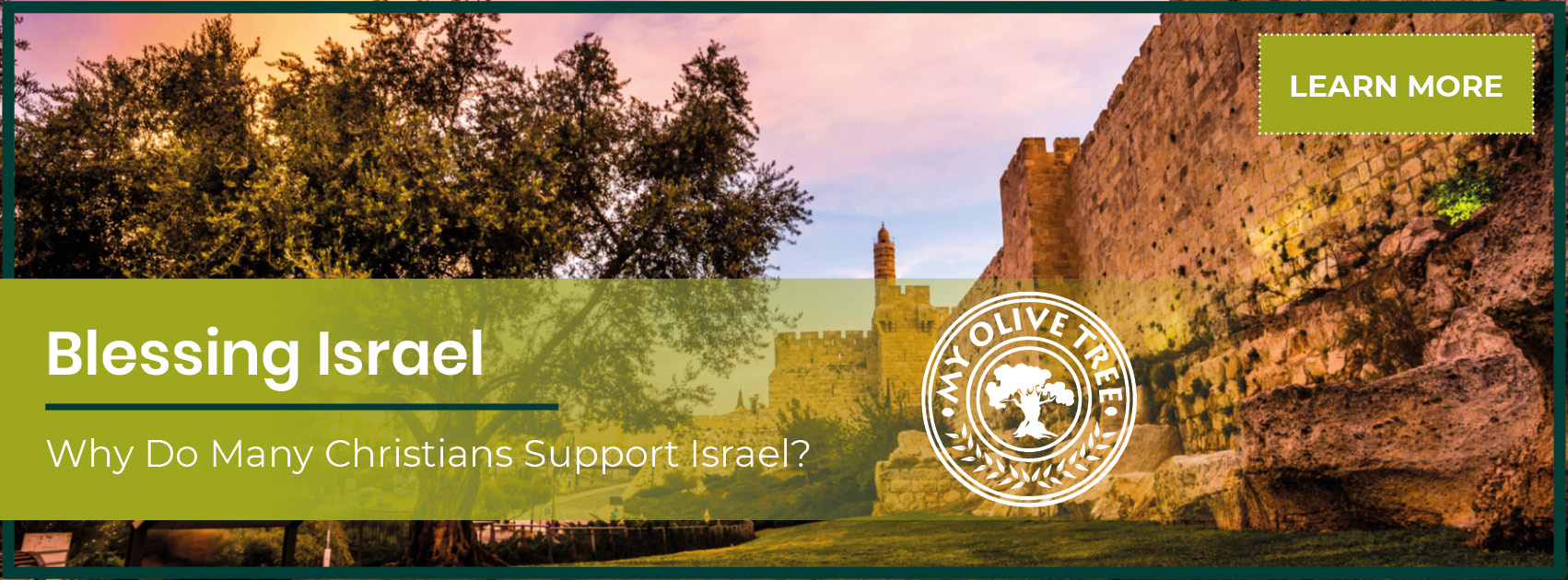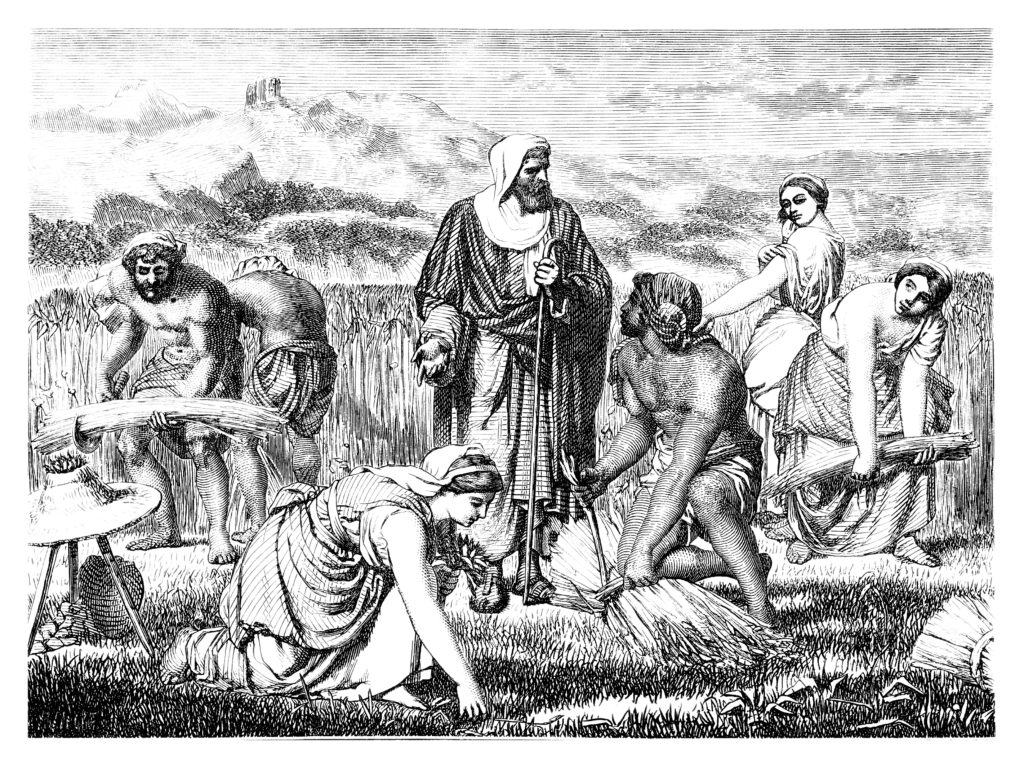Ruth is an important biblical figure. But why is the book of Ruth read during Shavuot along with God’s laws? What connects her journey to such a holy, God-ordained time?
Join us as we explore the answers to these questions and discover how the story of Ruth continues to teach us today!
The Importance of the Story of Ruth
The book of Ruth is often read during the biblical holiday of Shavuot, along with the Law given to Moses on Mount Sinai. But why is that? How do the two connect to Shavuot?
The reading of the Law is fitting when we consider what Shavuot is. Shavuot, also known as the Feast of Weeks, is a harvest festival that celebrates what God has given. It causes us to recall God’s goodness, to give of that goodness to others, and as a result, to look back at God’s Word and the Law to remember what is expected of us.
Yet, what about the book of Ruth? This biblical book centers on a woman from Moab, believed through oral tradition, to be a high ranking Moabitess! Not only that, but there are many who say that Ruth was the granddaughter of Eglon, king of Moab. Eglon, being the grandson of King Balak, who had regrettable dealings with Moses; the same Moses who brought down the tablets of God’s Law from Mount Sinai! The very Law read over Shavuot! Which begs the question… why Ruth? Why the potential descendant of an enemy of the children of Israel?
Why would anyone choose to read the story of Ruth and follow her journey during one of the holiest celebrations of the year?
The answer lies in two primary focuses of the Shavuot celebrations:
First—A more modern-day reason is that the Jews, having not fully embraced the gift of God’s Law in the past, today put forth a special effort to be thankful for that gift. Ruth, therefore, being a Gentile who not only came to cherish the Law, but put it into practice so completely—altering every aspect of her life—is a wonderful example of joyfully embracing the laws the Jewish people now so cherish.
“…Boaz answered… ‘It has been fully reported to me, all that you have done for your mother-in-law since the death of your husband, and how you have left your father… mother and the land of your birth, and have come to a people whom you did not know before.’”
—Ruth 2:11
Second—Shavuot was, and is, a holiday focused on harvest and firstfruits… of giving and reaping. Today this is largely recognized through the foods eaten, by bringing plants into the home, or by giving. Yet, harvest and firstfruits are still important to Shavuot, and the story of Ruth focuses on many points related to this theme…
“…anoint yourself, put on your best garment and go down to the threshing floor…”
—Ruth 3:3
For instance, Shavuot commands that those in need are allowed to glean behind the harvesters and/or gather the outer edge of crops. In the book of Ruth we see that it was this very command of gleaning that brought Ruth into her future…
“…You are witnesses this day that I have bought all that was Elimelech’s… from the hand of Naomi. Moreover, Ruth the Moabitess… I have acquired as my wife… You are witnesses this day.”
—Ruth 4:9-10
Beyond this, we see harvest-timed events throughout the book of Ruth. The most prominent being Ruth’s redemption by Boaz during Shavuot—eventually becoming the grandmother of King David, the great-grandmother of Solomon, and in the lineage of Jesus. Yet, these are not the only ones to be found in the book of Ruth…
Ruth’s Journey in the Bible
Ruth is brought to our attention after she is widowed, when her security and hope were well tested… This is when the story of Ruth begins.
Having buried her husband, Mahlon, Ruth chose to follow her mother-in-law, Naomi, despite Naomi’s repeated attempts to have her turn back and return to her family. Yet Ruth, understanding honor, love, and God’s ways, refused to turn back, saying:
“…‘Entreat me not to leave you,
or to turn back from following after you;
for wherever you go, I will go;
and wherever you lodge, I will lodge;
your people shall be my people,
and your God, my God.
Where you die, I will die,
and there will I be buried.
The Lord do so to me, and more also,
if anything but death parts you and me.’”
—Ruth 1:16-17
With this initial meeting of Ruth and some of the first words she speaks, we learn of her determination, her love of Naomi, and of course, her love of God.
While this, in and of itself, is a lesson to us to love and follow after God, Ruth’s story progresses further…
No longer wishing to serve the false god she once did, and wanting to care for Naomi, Ruth followed her on what was likely only a one to two-week journey—yet, in her heart would have felt much longer, knowing she may never return.
This one decision to let love guide her actions meant she never saw her parents again… but her hope was not diminished. Her heart knew the glory of following God and of doing right by her mother-in-law who had lost her husband and sons—all her family in Moab. As far as we know, Ruth never regretted her decision. She never second guessed it.
The fact that Ruth does not complain or second guess her decision, even upon arriving in Bethlehem where she—a Moabitess—likely faced many hardships besides Naomi’s poverty, is beyond what flesh-filled logic might deem wise. Even Naomi’s own bitterness was not enough to dampen Ruth’s spirits!
Ruth took everything in stride. She did not try to have Naomi work or call upon her old friends and relatives for food. Instead, she eagerly went out into the fields to glean. She supported Naomi without ridicule or pride, working for the majority of the day in the hot sun.
It was Ruth’s lack of condemnation and a heart of love that first caught the attention of Boaz, the owner of the field she gleaned in and a relative to Naomi. Ruth did not shout out what she was doing for her mother-in-law, yet the tale of her kindness still reached Boaz. Her heart commanded attention.
“And Boaz… said to her, ‘It has been fully reported to me, all that you have done for your mother-in-law since the death of your husband, and how you have left your father and your mother and the land of your birth, and have come to a people whom you did not know before. The Lord repay your work, and a full reward be given you by the Lord God of Israel, under whose wings you have come for refuge.’”
—Ruth 2:11-12
Ruth found favor in the eyes of Boaz, and he ordered his men to leave extra stalks behind for her to glean and to allow her to drink the water they collected. Boaz also saw to it that she was fed and treated well while in his fields, and that no one chastised her.
Later, as the harvests neared their ends—approximately three months from when the gleaning first began—Ruth would again find favor…
For when Naomi instructed Ruth to go to the threshing floor at the end of Shavuot, Ruth listened, doing everything Naomi said; going to Boaz on the threshing floor after he ate and drank his fill, lying at his feet as he slept. When Boaz awoke, Ruth asked him to take her under his wing—she asked him to redeem her!
Yes, her mother-in-law Naomi had told her to go lay at Boaz’s feet… yet Ruth used the language of the Israelites. Ruth spoke in a way that Boaz might understand, choosing to honor Naomi by doing her will, rather than going to seek a younger or wealthier husband.
Because of her obedience and honor, Ruth found favor in the sight of Boaz. Yes, Boaz had to give first choice of acting as redeemer to a closer relative—due to the laws of the land—but it is likely that Boaz sensed how it would end. That his relative would choose to refuse, and that in turn he, Boaz, would receive Ruth. Boaz did not shy away from the task—not only because of Ruth’s relationship to Naomi, but because Ruth was a woman of character. A woman of God.
Therefore, when Boaz approached the nearer relation, he did not try to make Ruth sound more enticing. Boaz did not try to sway him to marry her, gladly doing so himself. Thus, Boaz redeemed Ruth, and she became his wife. Together they had a son named Obed, who would be the grandfather of King David—making thirty generations from Ruth to Jesus…
All this completing a story that in the natural would have felt an impossibility if told beforehand, yet was a Godly design of faith, hope, and love.
What Can We Learn from Ruth?
Ruth was a woman of good character. When Ruth asked Boaz to take her under his wing, he commented on how she was a virtuous woman. Not only that, but Boaz went further still, stating that all the people of his town knew it!
So what can we learn from the story of Ruth?
- We can learn that to be of good character, to be virtuous, is in part connected to how we treat others. Doing things not just for selfish reasons or gain, but out of love. Doing unto others as we would have them do unto us.
- We can learn that we reap what we sow. Ruth sowed love and kindness, therefore, she received that in turn. Yes, it directly ties to the fact that she was virtuous, but in it we are reminded that we have to sow to reap.
- We can learn the importance of patience and humility; for Ruth was patient and humble in everything she did. She was willing to travel a great distance from her home to make a new life with Naomi. She was willing to glean after the reapers for what should have been a pittance. And she was willing to wait for a God-given husband rather than any man who simply found her beautiful or was captivated by her good character.

So, how can we put the lessons of Ruth into practice?
In our day-to-day lives, we can turn to God for patience, love, and kindness… small, everyday lessons of the character God would have us embody. We can make choices which align with God’s heart and will for our lives and the lives of those we impact. We can adopt Godly habits and patterns; Godly character.
At My Olive Tree, through people like YOU, we are planting the land of Israel with olive trees and grape vines. By doing this, we are not only bringing the land of Israel to life, but we are showing the Father’s love to those who need it most. Giving jobs, hope, and love… in essence, acting as a Boaz to the people of Israel by not merely giving them food, but the tools and pride to gather their own.Let us in this hour show the good character of Ruth, planting seeds of love so that we too can reap a harvest… so that we might one day hear from our own Redeemer, well done my good and faithful servant.








